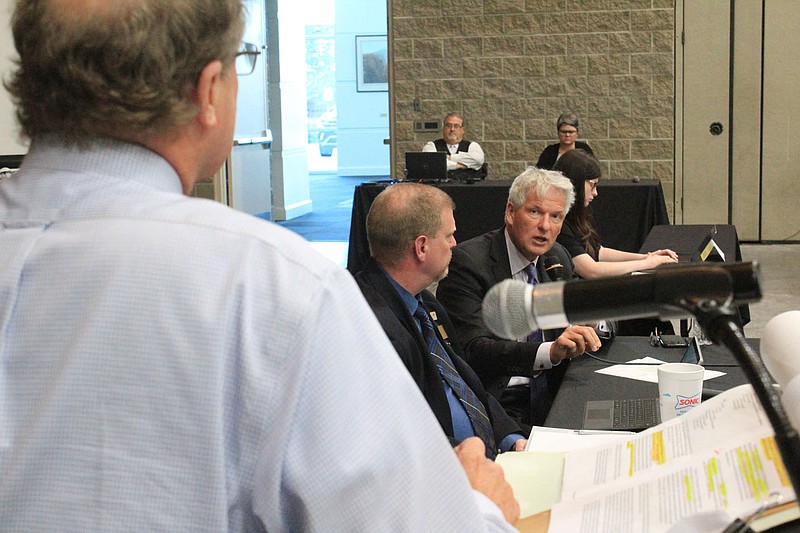FORT SMITH -- The city's environmental counsel has argued correspondence with federal officials to discuss sewer rate increase scenarios without public meetings afterward is common in consent decree negotiations across the country.
Attorney Paul Calamita at a consent decree update Tuesday said a June 5, 2020, email from an engineering group to the city about discussion wastewater rate increases were "projection scenarios" to continue good-faith negotiation with federal officials.
The city since 2015 has increased its wastewater rates 167% to pay for improvements to its sewage system following its federal decree lodged in response to decades of runoff -- a project Utility Director Lance McAvoy said will cost more than $600 million once complete.
Calamita's remarks came in response to accusations from attorney Joey McCutchen the city wasn't acting transparently in keeping the business from the public.
"This is done routinely in every single one of these negotiations," said Calamita, adding the public would have even less access to the records in states with stricter Freedom of Information Act laws.
The email from John Pruss of Burns and McDonnell states discussion with the city directors regarding future wastewater increases was done before June 5, 2020. It also states City Administrator Carl Geffken and McAvoy spoke to Burns and McDonnell the week prior about rate schedules, water use trends and capital improvement plans.
The email was one in a batch sent to the city's "Board of Director Email Group" that Sebastian County Circuit Judge Gunner DeLay on June 11 ordered be released to McCutchen in response to a FOIA request. In a news release before the court hearing, McCutchen said he was concerned directors were having "secret discussion" about the decree and other public business.
"What are your intentions in regard to future water and sewer rate increases, and when are you going to make that decision, and are those decisions going to be discussed in public?" McCutchen asked the board at the meeting.
Kevin Settle, an at-large city director, told McCutchen any discussion about water or sewer rates will be public as it has been in previous years.
Lavon Morton, Ward 3 director, said he interpreted the proposed wastewater increases in the discussion as Calamita did -- projections.
"It happens in the business world all the time. It's a negotiation. It doesn't mean anything," Morton said.
"We had to find some number where we could start to have a conversation about it, and that's our job," Calamita said.
Calamita anticipates the city will need to raise its sewer rates to show federal officials it's making an effort in the decree. His remark was in response to federal Judge P.K. Holmes' decision an 11% increase per year wouldn't be enough to give the city relief.
The blow could be lessened if it gets two three-year extensions for covid-19 and the Arkansas River flood of 2019, Calamita said. The city has 5½ years to complete the terms and conditions of the decree if a five-year extension granted in 2020 doesn't go into effect.
Geffken and Deputy City Administrator Jeff Dingman in April estimated the city had spent $300 million on consent decree-related expenses.
More News
FOIA Law
The Arkansas Supreme Court in 2019 ruled three directors and the city administrator didn’t violate the Arkansas Freedom of Information Act in using email to discuss city business.
Source: Arkansas Supreme Court
